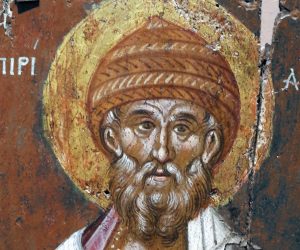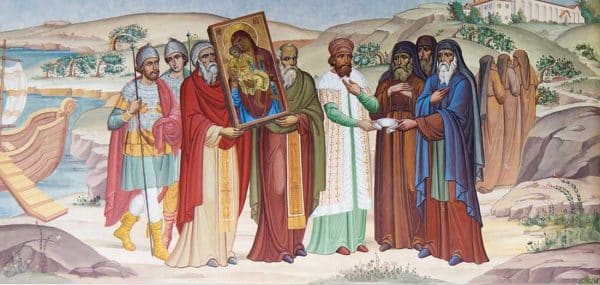Saint Spyridon of Trimythous
 Saint Spyridon, also known as Spyridon of Trimythous, is a revered saint in the Eastern Orthodox Church, celebrated for his devout faith, miraculous works, and role as a bishop in the early Christian Church. He lived during the 3rd and 4th centuries and is best known for his participation in the First Council of Nicaea in 325, where he staunchly defended the doctrine of the Holy Trinity against Arianism, a theological controversy that challenged the divinity of Jesus Christ.
Saint Spyridon, also known as Spyridon of Trimythous, is a revered saint in the Eastern Orthodox Church, celebrated for his devout faith, miraculous works, and role as a bishop in the early Christian Church. He lived during the 3rd and 4th centuries and is best known for his participation in the First Council of Nicaea in 325, where he staunchly defended the doctrine of the Holy Trinity against Arianism, a theological controversy that challenged the divinity of Jesus Christ.
Saint Spyridon was born in the village of Askeia, in Cyprus, around the end of the 3rd century. He was a shepherd by profession, leading a simple and humble life. After the death of his wife, he was ordained a priest and later became the Bishop of Trimythous. Despite his ecclesiastical status, Spyridon maintained a life of simplicity and continued to tend his sheep, embodying the virtues of humility and compassion.
Miracles and Teachings
Saint Spyridon is attributed with many miracles and acts of kindness, which contributed to his widespread veneration. He is said to have possessed the gift of healing, the ability to expel demons, and the power to produce miraculous occurrences, such as turning a snake into gold to provide for a poor man in need. His miracles often served to reinforce his teachings about the Christian faith and the mercy of God.
One of the most famous stories about Saint Spyridon from the First Council of Nicaea involves his miraculous demonstration of the Holy Trinity. He is said to have held a potsherd in his hand, which then burst into flame, turned to water, and left clay in his palm, symbolizing the Father, Son, and Holy Spirit as distinct but united entities. This vivid illustration helped to confound the heretical arguments of the Arians at the council.
Legacy and Veneration
Saint Spyridon’s legacy is marked by his deep faith, pastoral care, and the miraculous events attributed to him, which continued even after his death. His relics, which are said to be incorrupt, are housed in the Church of Saint Spyridon in Corfu, Greece. They are venerated by thousands of pilgrims annually, especially on the feast days dedicated to him. The main feast day of Saint Spyridon is celebrated on December 12th in the Gregorian calendar (December 25th in the Julian calendar), commemorating his repose.
In iconography, Saint Spyridon is often depicted wearing a shepherd’s hat and holding a potsherd, symbolizing his miracle at the First Council of Nicaea. He is considered the patron saint of potters and Corfu, where his relics are believed to have protected the island from various calamities.
Saint Spyridon’s life and miracles exemplify the power of faith and the belief in the intercession of saints within the Orthodox Christian tradition. His story continues to inspire devotion and provides a testament to the enduring legacy of the early church fathers and their defense of Christian doctrine.
